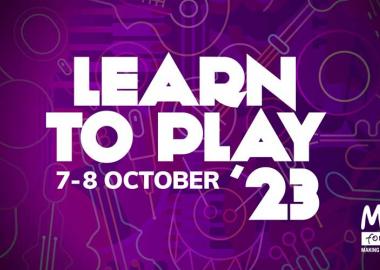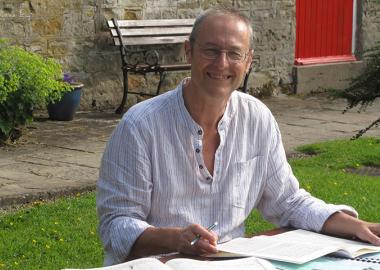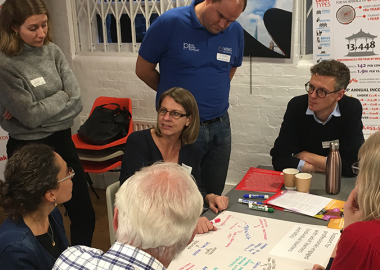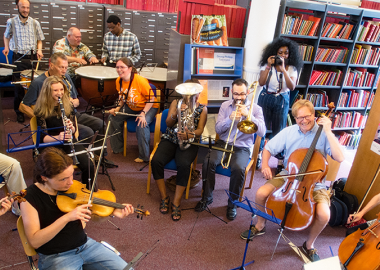Andy Jackson, the inspirational leader of the Cobweb Orchestras, thought the best way for me to get an idea of how they work would be to join in one of their groups, so he organised a cello for me to play. What Andy didn’t know until I met him in the Sage Gateshead café that day was that I had never held a cello before in my life.
Amazingly, he did not bat an eyelid. He asked someone to tune it for me, someone else to show me the rudiments of how to play it and a third person to hand the sheet music to me for the pieces scheduled to be played that day.
Nobody, neither Andy nor anyone in the group, suggested for a minute that I shouldn’t join in or that it would be anything outside the norm just to have a go.
With such a friendly and accepting stance from conductor and group members, my intimidation at sitting next to the first cello, in the front row, and not knowing anything about how to play the instrument melted away, and I became determined to at least give it a very good shot.
I do read music, play the piano (though rarely) and occasionally sing in choirs. But I’d never followed an orchestral part, nor did I know the pieces so I was trying to read fast enough to pick out the few notes I would be able to play, and then play them. I was very proud indeed at even hitting a few, and getting them right - I think, as my neighbour’s notes sounded at least very similar!
Some pieces in this end-of-term rehearsal were easier than others; and the third and fourth movements of Beethoven’s 4th had me beat. (I was also getting tired by then – I had been concentrating furiously on this unfamiliar activity for nearly two hours and my bowing arm was killing me: despite my ad hoc tutor’s best efforts, I wasn’t getting the holding position right…).
When the session finished, I was bereft. I had enjoyed myself enormously, even just playing the first notes of bars; I had become part of an orchestra in just two hours; and the group members could not have been nicer and more supportive, despite my clearly extremely patchy contribution! If I was living in Newcastle, I’d be seeking a cello teacher immediately and joining the group regularly after the Easter break.
Following the rehearsal, Andy and I talked about the distinguishing features of Cobweb’s model. Here are some we picked out:
- Cobweb is genuinely welcoming (conductor and players), and it made such a difference to me (and I’m not usually shy or diffident!)
- It's non-competitive and accessible to all: it’s not about how ‘well’ you play, it’s about taking part, and enjoying playing the orchestral repertoire
- Any number of instruments are welcome: not just two clarinets!
- Non-orchestral instruments can join, and you can swap instrument. 10 flutes? But no horns, mmm, let me have a go….
- An instrument bank you can borrow from for free
- You don’t have to sign up for any length of time: come along to sessions when you can
- There are groups in the daytime, in the evening, in cities, in rural locations
- It needs a type of conductor as good at people management as s/he is at orchestral conducting
Making Music will be looking at what guidance can be rolled out to other orchestral groups who wish to make themselves more accessible; whether the model is something that, with funding to get it going, could be replicated elsewhere to enable more people to enjoy playing the orchestral repertoire; and what development work might be needed with orchestral conductors, to empower them to lead such open access ensembles.
Meanwhile, if you’re lucky enough to live in the North East and always wanted to try the trumpet, you know where to go….










